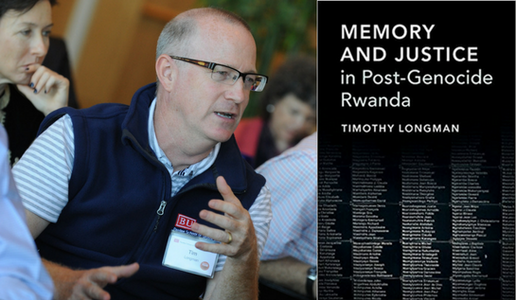Longman Wins Best Book in African Politics at ASA Meeting
Timothy Longman, Associate Professor of International Relations and Political Science and Director of the Institute on Culture, Religion and World Affairs at the Frederick S. Pardee School of Global Studies at Boston University, was awarded the Best Book in African Politics from the African Politics Conference Group for his book Memory and Justice in Post-Genocide Rwanda (Cambridge University Press, July 2017) at the African Studies Association Annual Meeting held in Atlanta from November 29 – December 1, 2018.
Longman’s book also received honorable mention for the Melville J. Herskovits Prize for the best book in African studies, and honorable mention for the Bethwell A. Ogot Prize for the best book in East African studies at the conference.
In Memory and Justice in Post-Genocide Rwanda, Longman brings 25 years of research in Rwanda to the table and focuses on the current Rwandan government’s social engineering project and how the population has responded while broadly analyzing the government’s social policies. Longman argues that despite good intentions and important innovations, Rwanda’s authoritarian political context has hindered the ability of transnational justice to bring the radical social and political transformations that its advocates hoped.
The APCG committee called Longman’s book “a path-breaking account based on decades of intensive fieldwork that weaves together personal narrative, historical analysis, and research findings. Although focused on a single African country, the book’s core argument is relevant to other contexts within Africa and beyond, including processes of transitional justice in Latin America and ongoing debates about Confederate monuments in the United States. … This is a bold and brave piece of scholarship that will no doubt cause political waves in Rwanda and provides sobering lessons for the international community about transitional justice elsewhere.”
The Herskovits Prize committee wrote, “Books in the social sciences that successfully manage to mix scientific rigor with personal engagement are few and far in between. Timothy Longman’s Memory and Justice in Post-Genocide Rwanda is a prime exemplar of such a tour de force. … One of Longman’s greatest contributions is to show that transitional justice is not necessarily democratizing but can lead to authoritarian restoration. … Rwanda, its genocide, and post-genocide politics have been the subject of a fair number of books. In this relatively crowded field, which is not lacking in quality contributions, Longman’s work nevertheless stands out for its depth, its at times deeply personal commitment, and its broader contributions to theories of justice and democracy.”
Established in 1957, the African Studies Association is the flagship membership organization devoted to enhancing the exchange of information about Africa. Every year the ASA hosts an international conference, which is attended by approximately 2,000 participants from around the world and across all academic disciplines. The ASA Annual Meeting is the largest gathering of Africanist scholars in the world. With an attendance of about 2,000 scholars and professionals, the conference offers more than 300 panels and roundtables, plenary events featuring keynote speakers, awards ceremonies, institutional and organizational receptions and meetings, an international exhibit hall, and screenings of award-winning movies from Africa.
